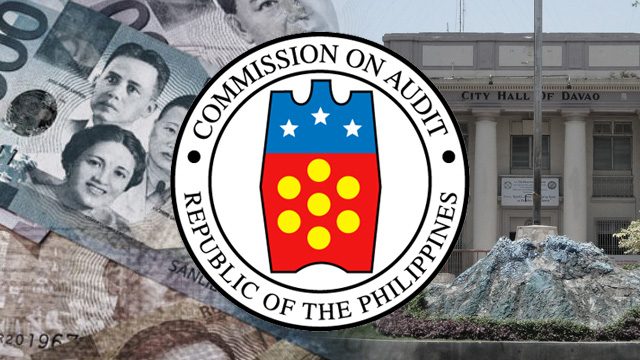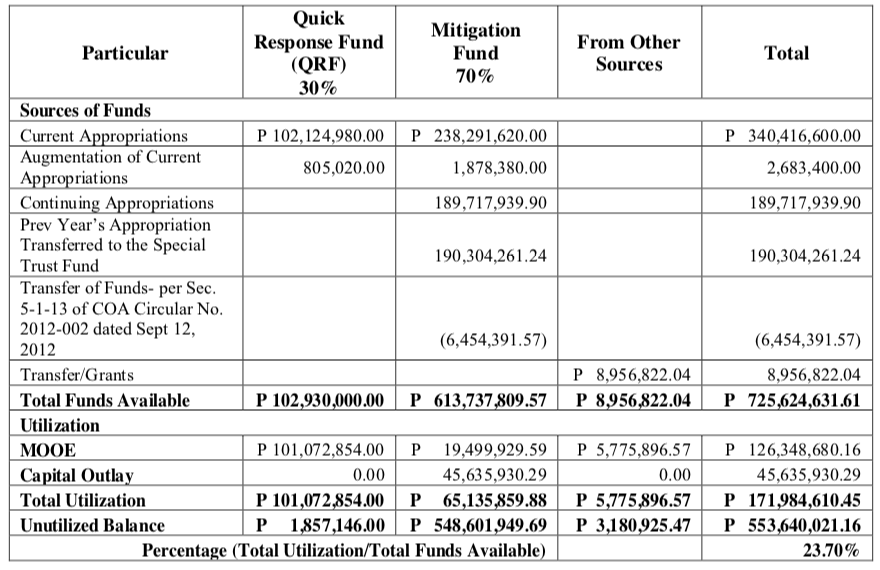SUMMARY
This is AI generated summarization, which may have errors. For context, always refer to the full article.

MANILA, Philippines (UPDATED) – The Davao City government did not use P560,580,021 million worth of funds for different projects in 2017, according to the audit report recently released by the Commission on Audit (COA).
COA said that despite funds available to the city government, livelihood projects like fishery and vegetable production were not started, disaster prevention and mitigation programs were not implemented, and a biogas facility yet to be built.
PAMANA program
In January 2017, the Davao City government received P5.4 million from the Department of Agriculture to implement the Payapa at Masaganang Pamayanan (PAMANA) projects. PAMANA is the government’s peace program that aims to address development problems of conflict-affected communities.
The Davao City plan was to implement projects such as an integrated sustainable vegetable production system, white corn production, municipal fishery development project, agri-fishery processing, and capacity building.
As of December 31, 2017, only 2.2% of the funds or P119,626 of the P5.4 million was spent for catering services, office and janitorial supplies, medical equipment, and kitchen utensils.
“It can be construed that most of the above transactions, while they may be allowed in the agreement, are not among the major components of the projects. In fact, our review of the disbursement vouchers showed that the above transactions are mainly related to Capability Building and Agri-Fishery Processing,” said COA.
The major components were the construction of a multi-purpose building, establishment of vermin composting facility, and procurement of seeds/inputs and farm tools and equipment.
COA noted that the fund was available as early as 2014 in the national budget for the DA-PAMANA fund, but that it was transferred to Davao City much later, or in January 2017.
Originally, the PAMANA projects were supposed to be implemented from 2014 to 2016.
“The fund was intended for projects that should have already been implemented/completed years ago but mostly remained idle in the coffers of the City Government….Hence, given the current pace, and considering the major components that are still to be performed, there is a risk that the completion of projects and the influx of benefits therefrom may be further delayed,” the COA said.
In its reply to the audit team, the Davao City government said that when it received the fund in January 2017, it was “already beyond the implementation period stipulated in the Memorandum of Agreement.”
To this, COA said, “The fund was received after the implementation period, which should serve as a significant reason for the City Agriculturist’s Office to hasten the implementation of the project.”
Disaster funds
Davao City’s Local Disaster Risk Reduction and Management Fund (LDRRMF) has a standing budget of P553,640,021 but has only so far used 23.70% of the amount, “depriving the City constituents of the benefits had the projects listed in the LDRRMFIP been implemented during the year,” COA said.
As of December 31, 2017, only P171.9 million was spent, resulting in a low accomplishment rate.

“Failure to implement and complete the programs, projects, and activities within the year defeated the action of the management in earmarking funds which remained idle, unutilized, and unproductive,” COA said. (READ: Davao City’s 2014 calamity fund priorities questioned by auditors)
“Further, it hampers the achievement of timely delivery of desirable socio-economic development and environmental management outcomes to its intended beneficiaries as envisioned,” it added.
State auditors urged the city government to maximize its funds and “efficiently manage and address eventualities for risk or emergencies due to occurrence of man-made or natural calamities.”
Biogas facility
As early as 2015, the Davao City government received P1.5 million from the DA to install a biogas facility.
“To date, after more than two years, the fund transferred by DA-RFUXI remained unutilized and the installation of biogas facility has not yet been started,” said COA.
According to “verbal queries” of auditors with offices in charge of the project, the delay was due to the lack of technical expertise.
“It was also mentioned that there is only one service provider that is competent to undertake the project but lacks documentary requirements to enter into transactions with government agencies. This was the same cause of delay that was cited when the same project was not implemented in CY 2016 where an audit observation memorandum was also issued,” COA said.
The agency said the project is due for rebidding.
“Regardless, however, of the result of the rebidding, the delay in the influx of benefits that could have been enjoyed immediately by the beneficiaries is irreparable,” said COA.
Auditors added: “Given the period of time that have lapsed since the fund was received, and considering the issues causing the non-implementation of the project, the feasibility and implementation of the Biogas Digester Project is doubtful. Accordingly, it could be considered prudent that the fund be returned to the source agency or the national treasury rather than being kept dormant in the accounts of City Government.”
Asked to comment on the COA findings, Davao City Mayor Sara Duterte-Carpio said that the city government had submitted the required information and explanations to COA.
She welcomed the COA AOMs (audit observation memorandum) which “help us improve our system in transactions.”
The unutilized funds are part of COA’s observations and recommendations for Davao City in 2017, which includes P570 million worth of accounts and transactions that lacked documents. Duterte-Carpio said that questions on the P570-million funds had been “resolved.” – with a report from Mick Basa/Rappler.com
Add a comment
How does this make you feel?
There are no comments yet. Add your comment to start the conversation.